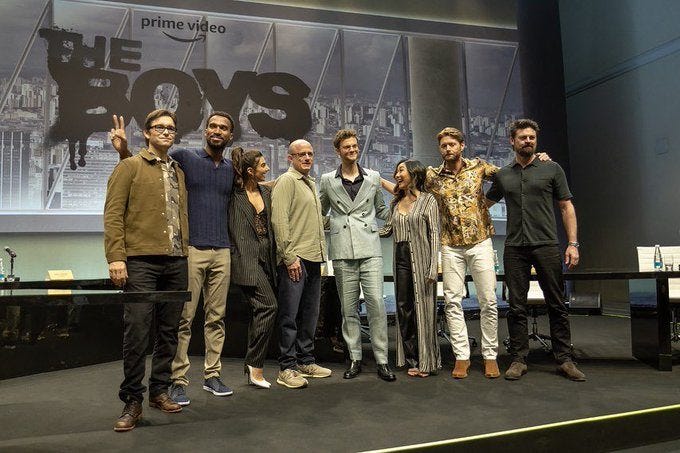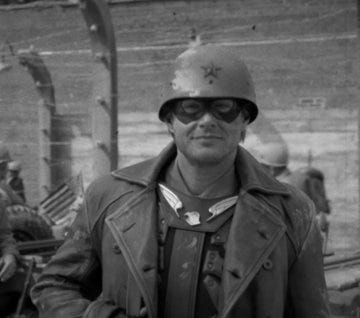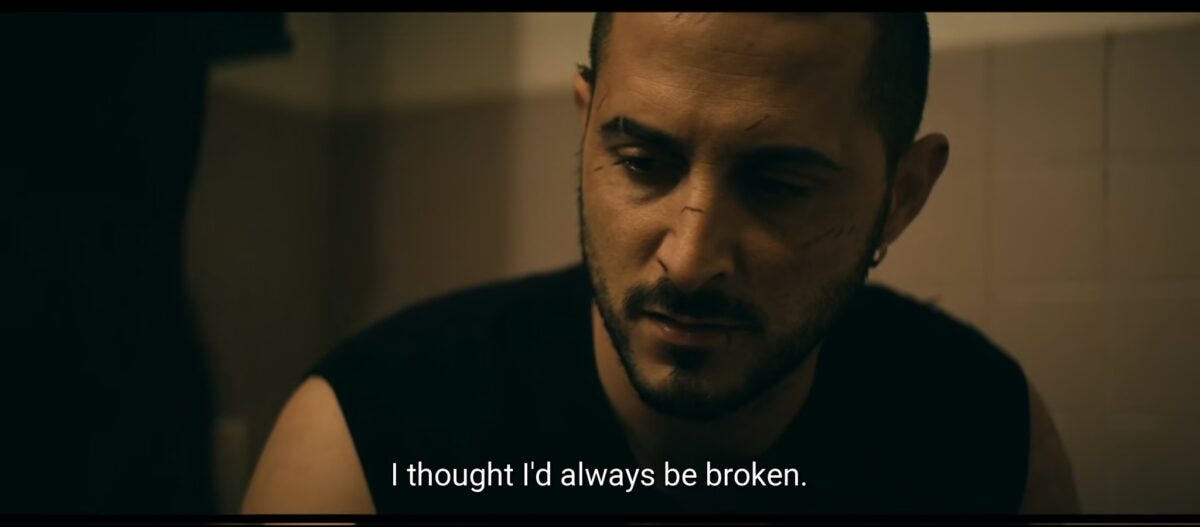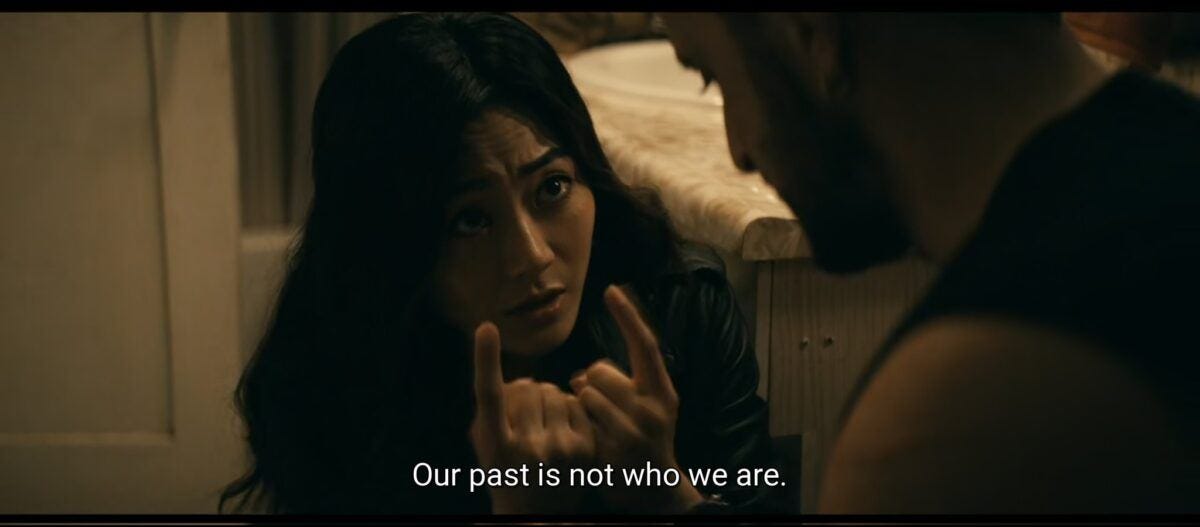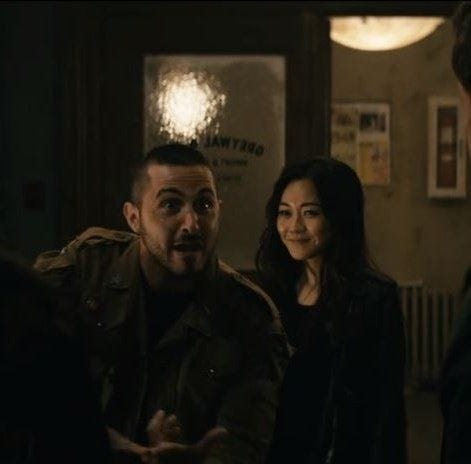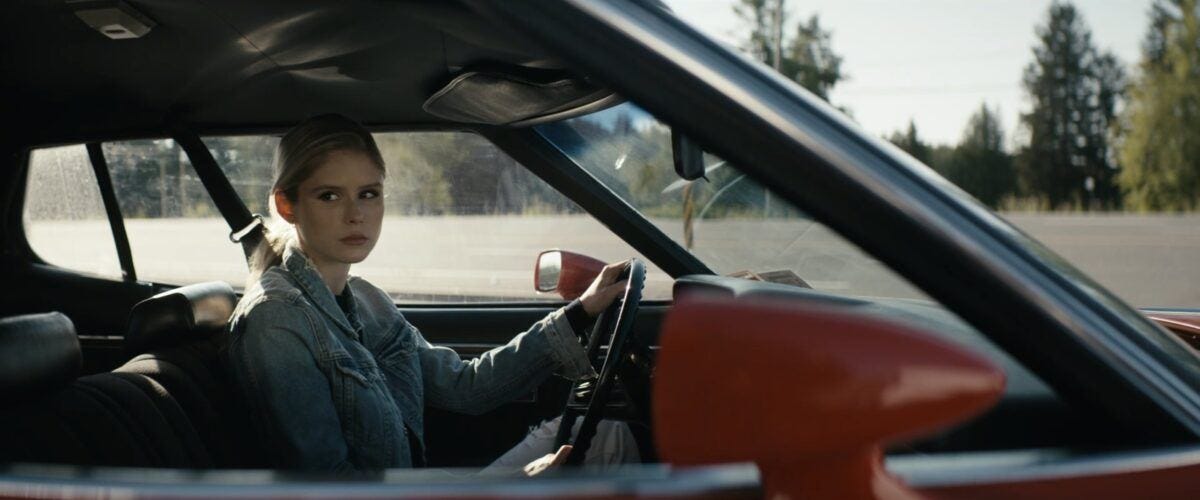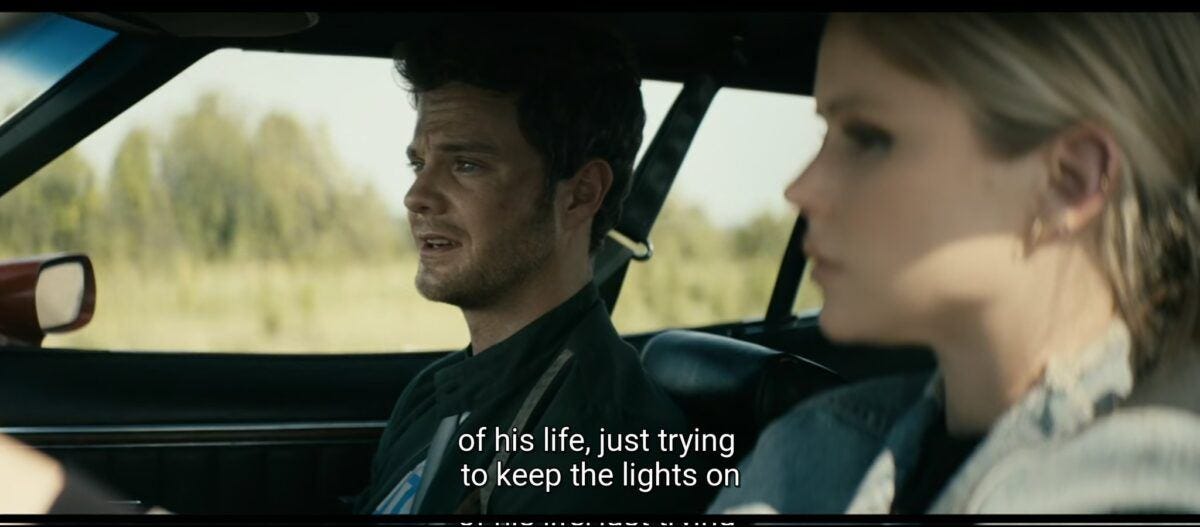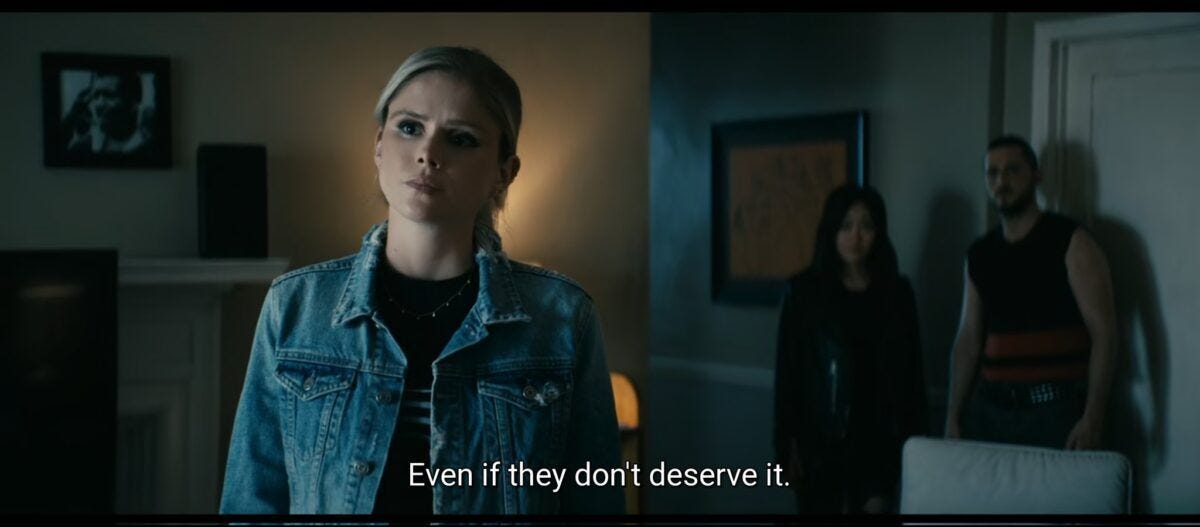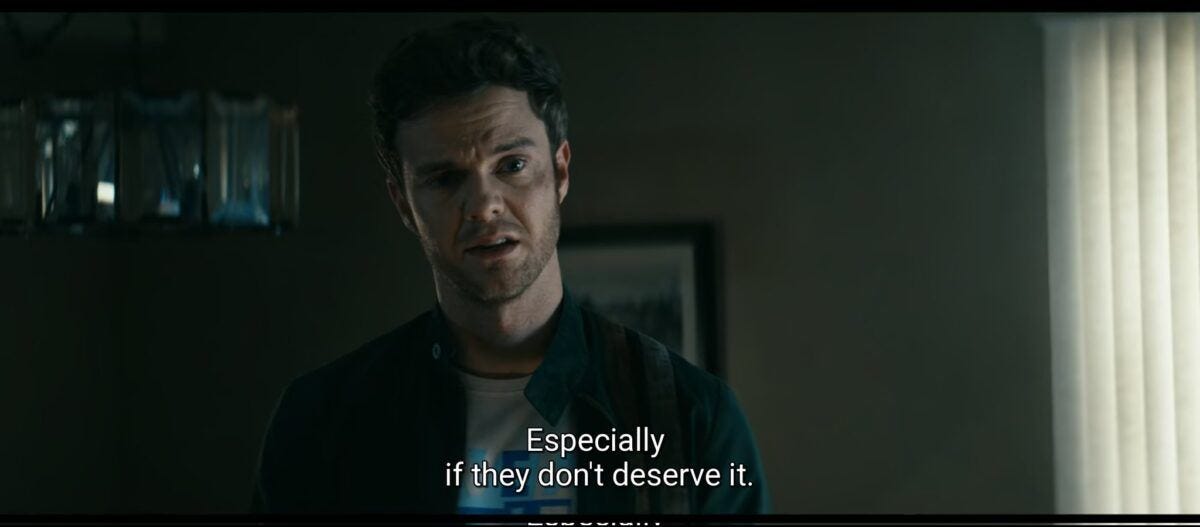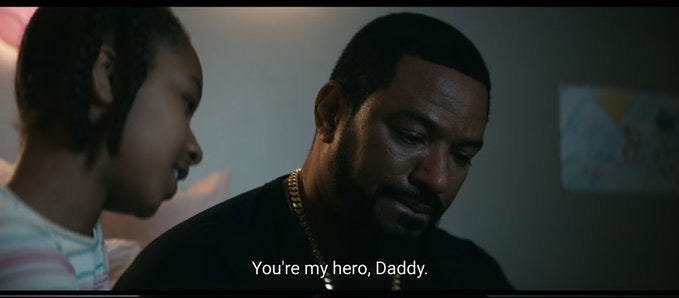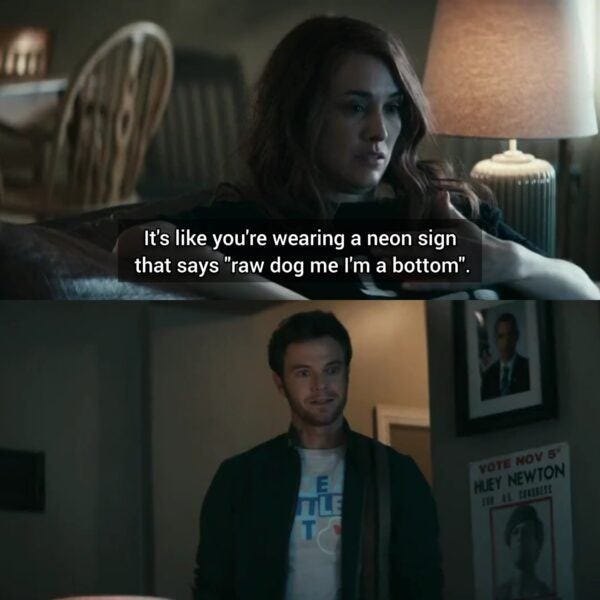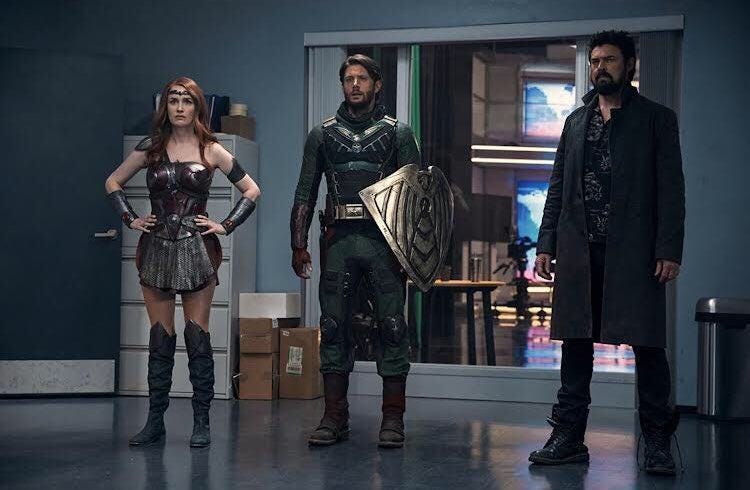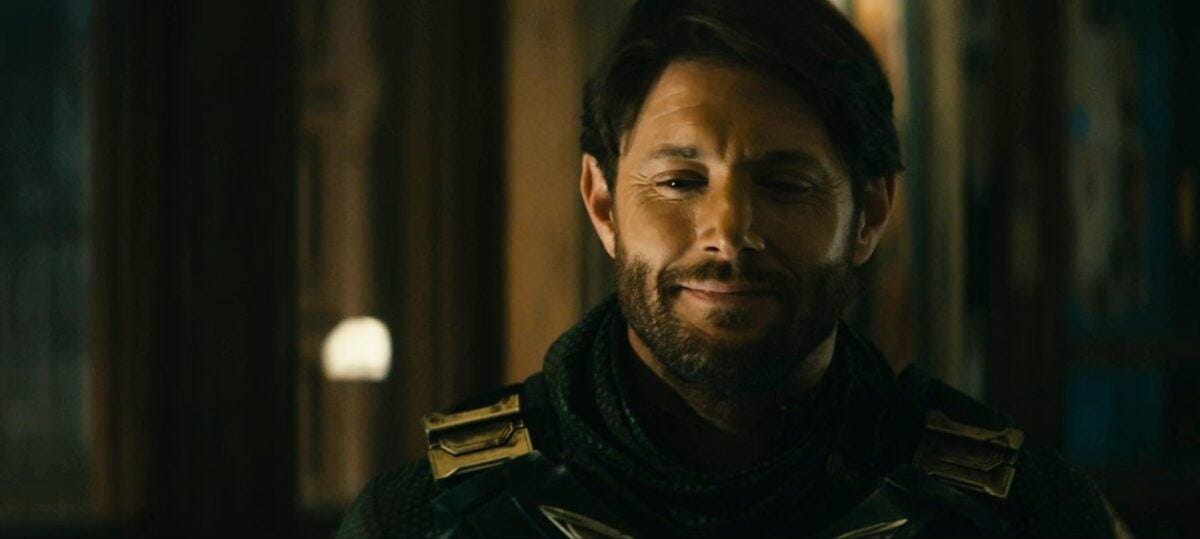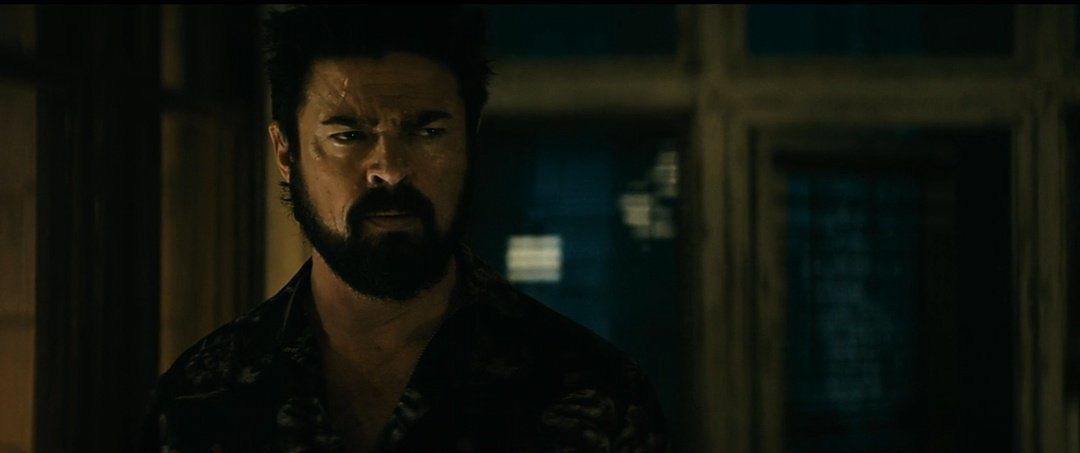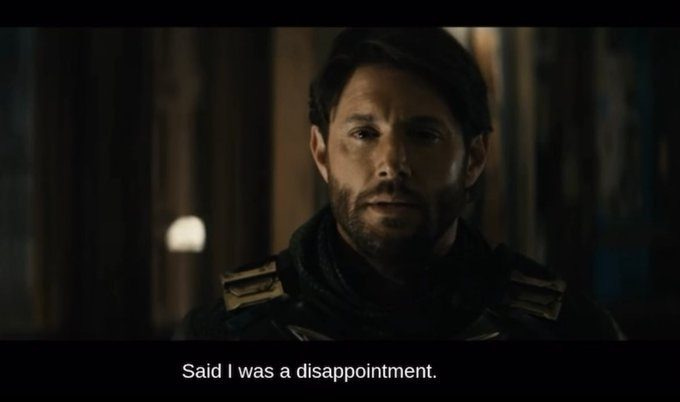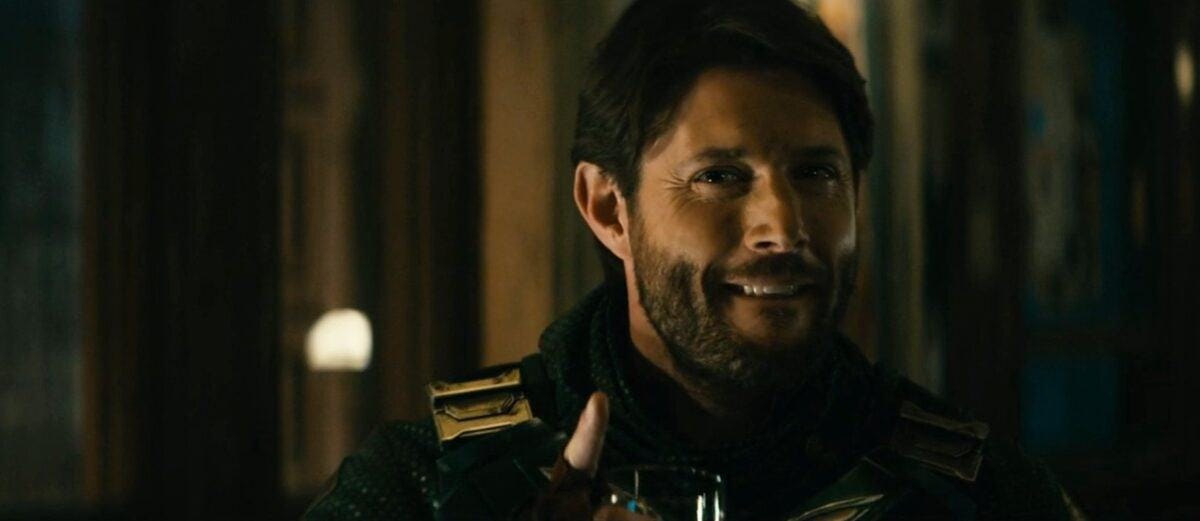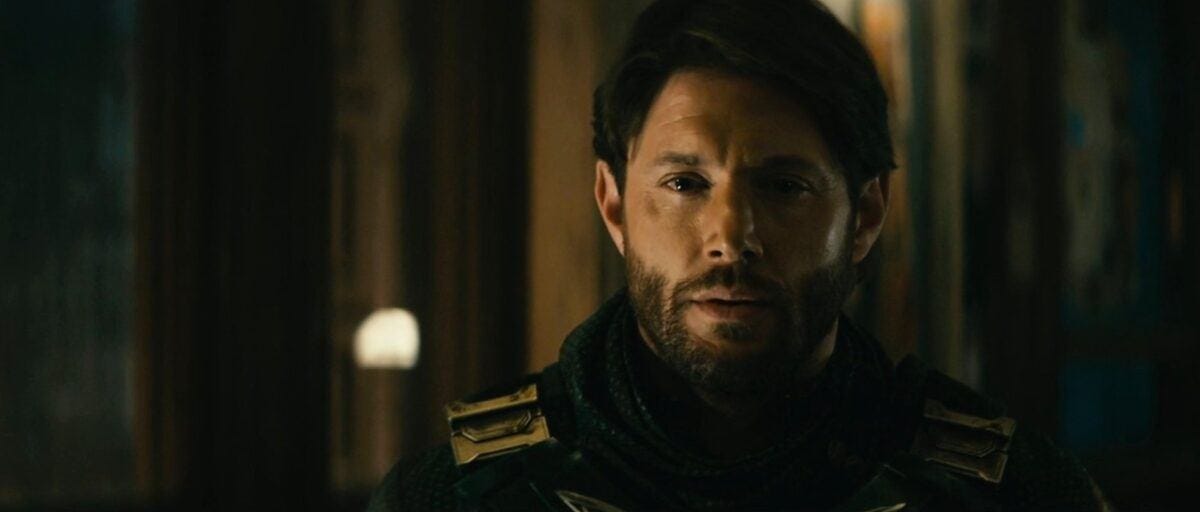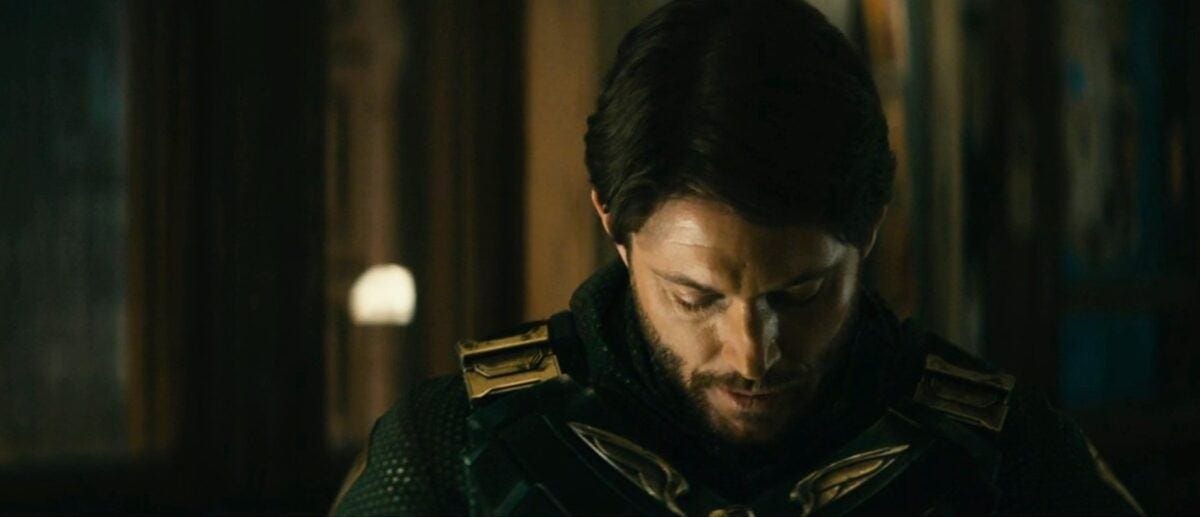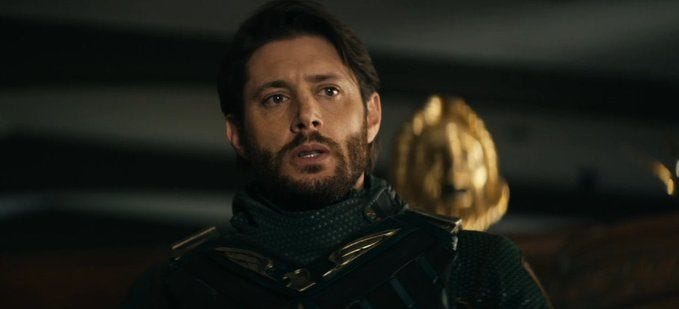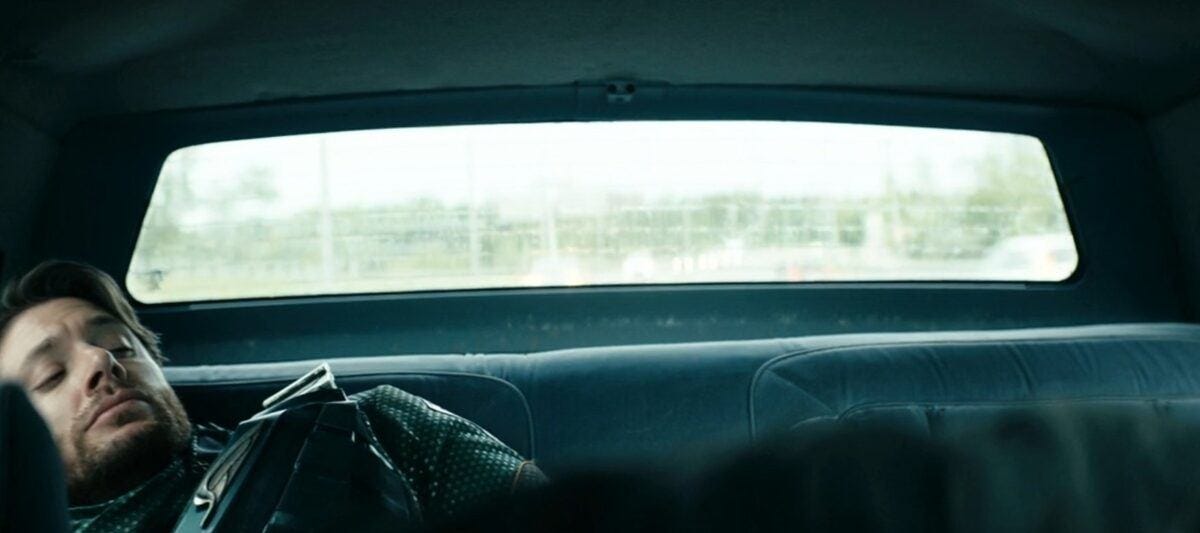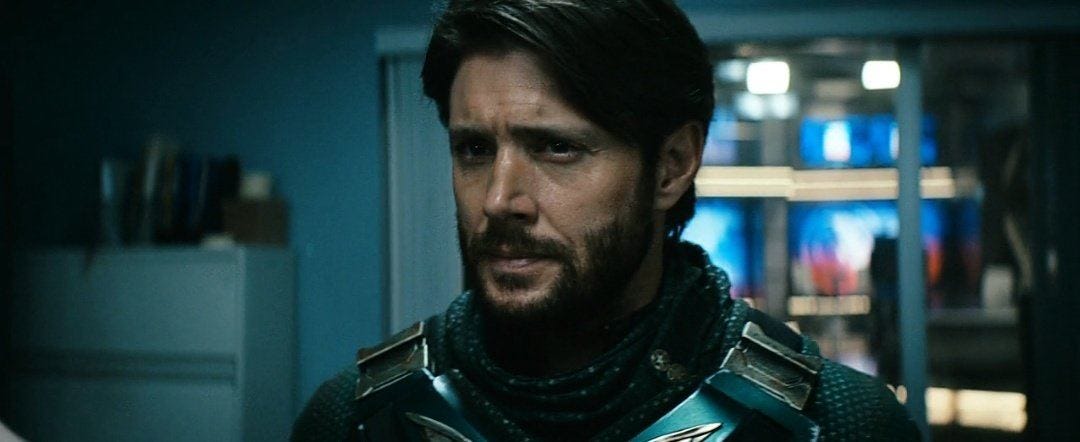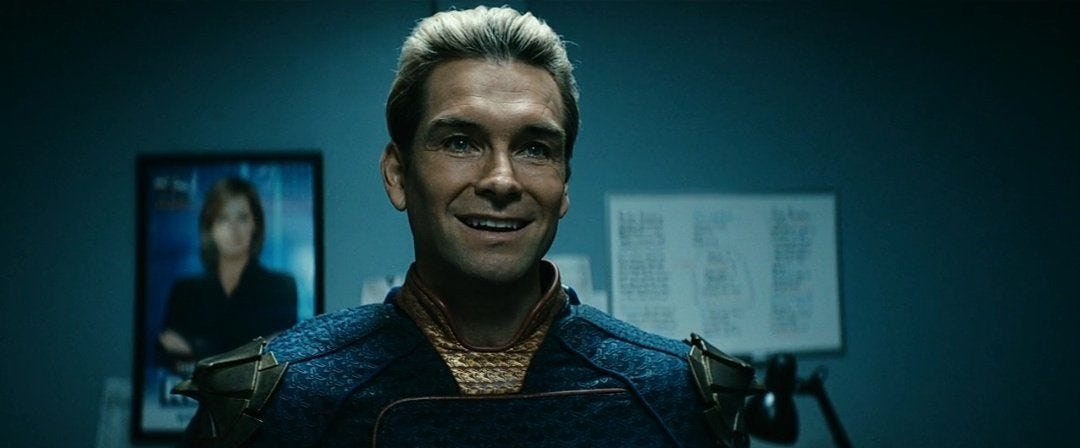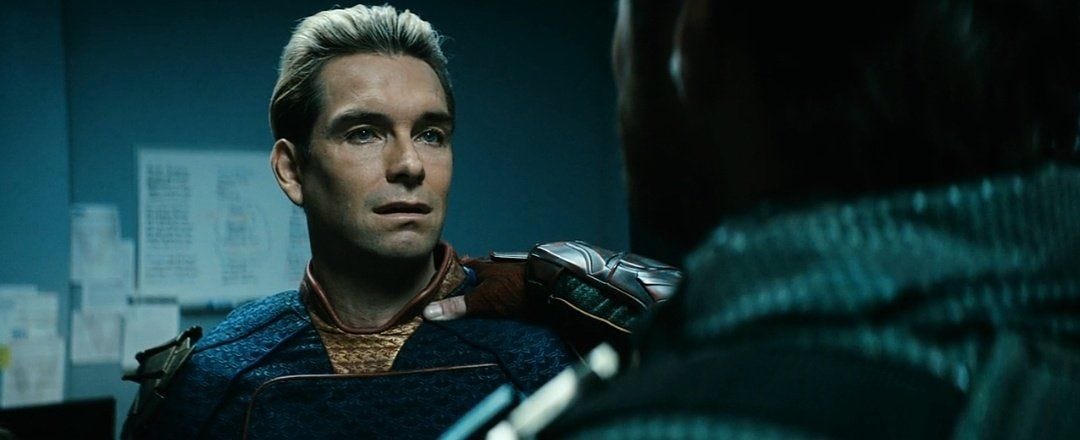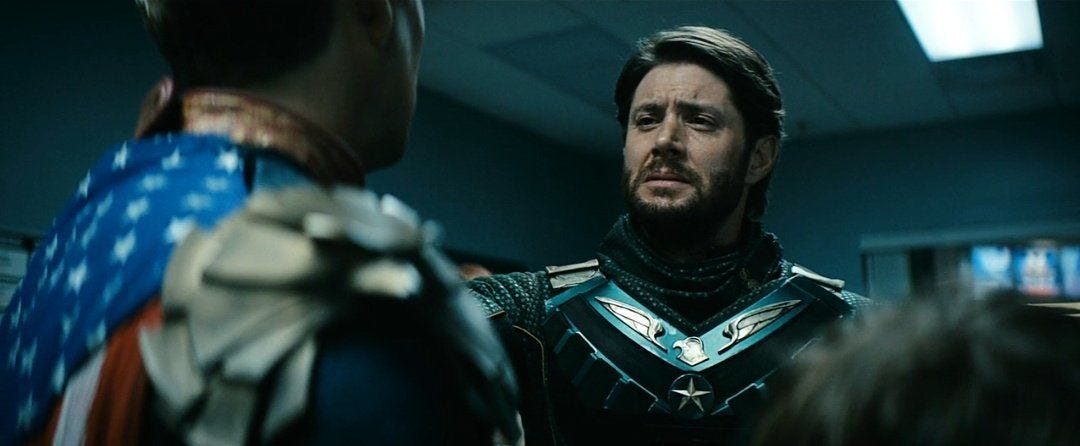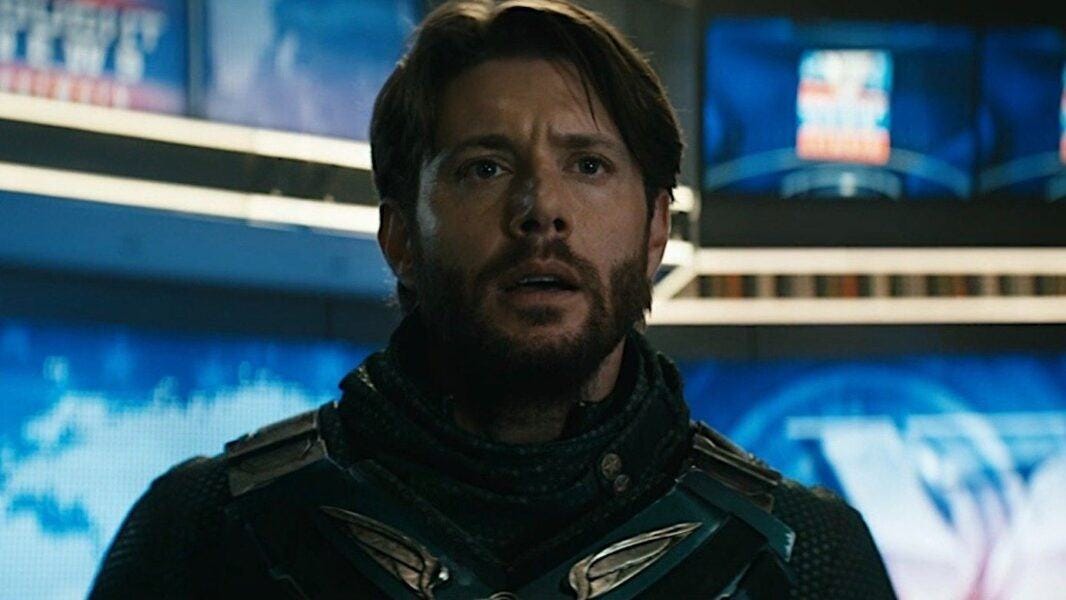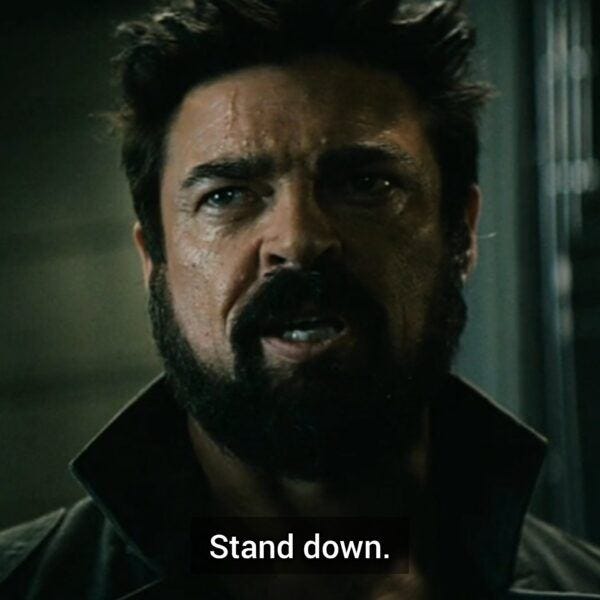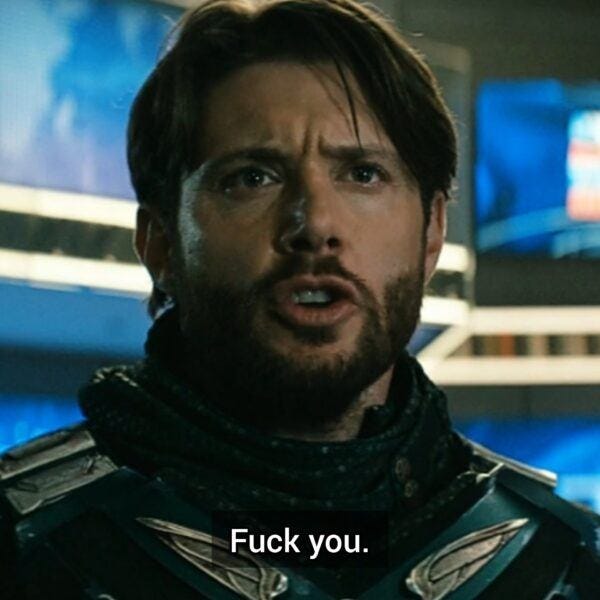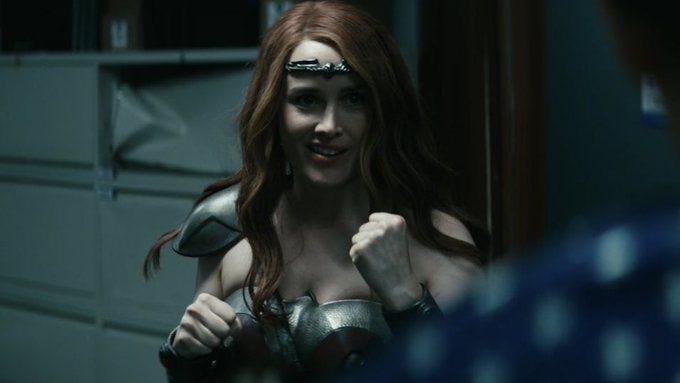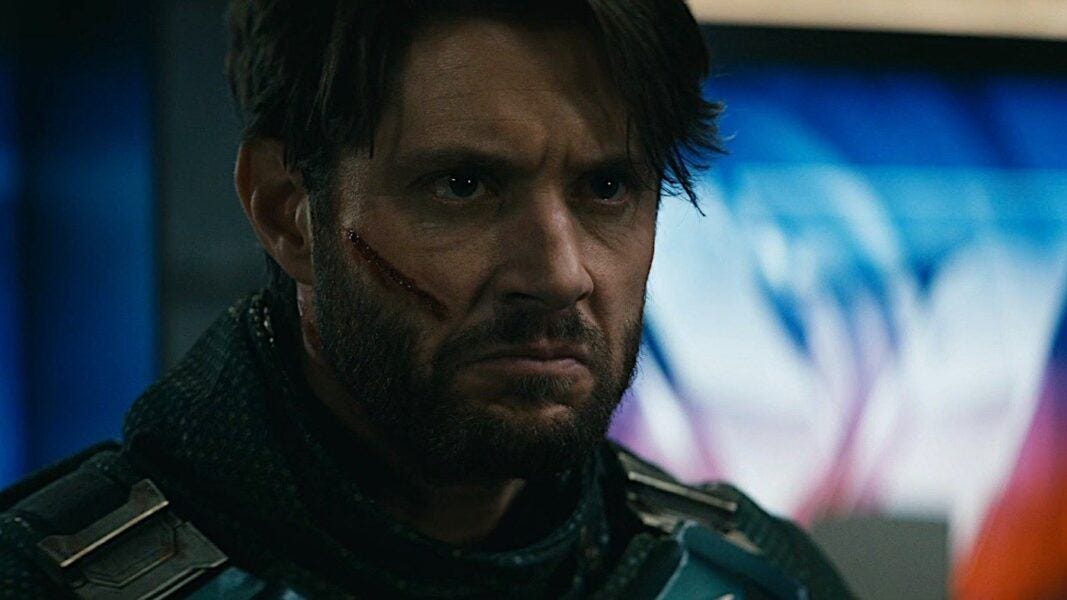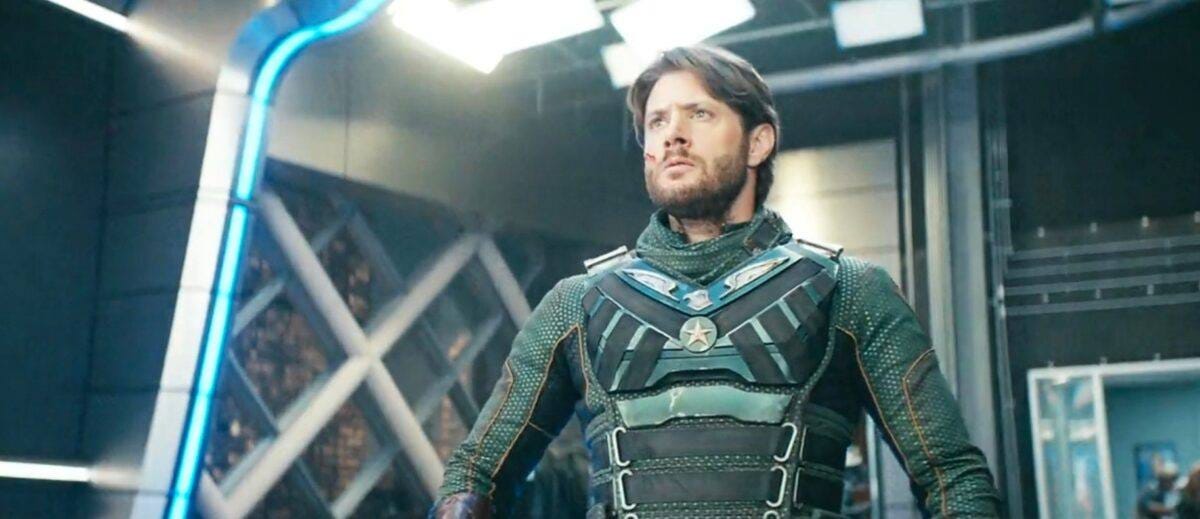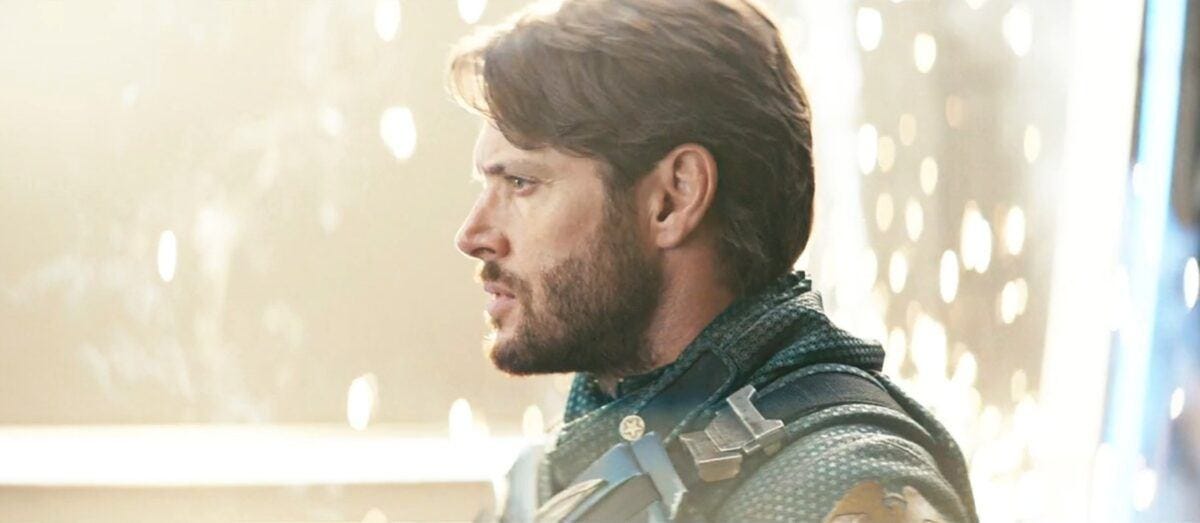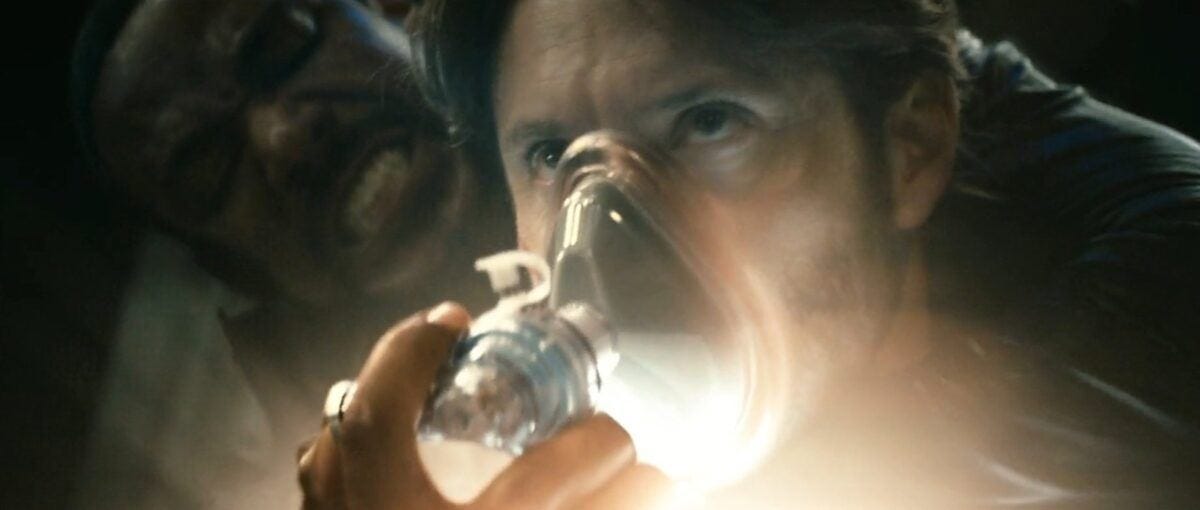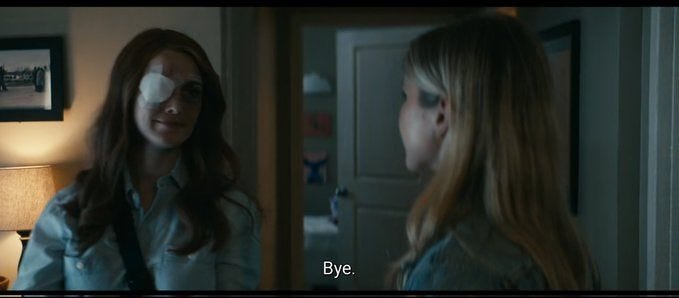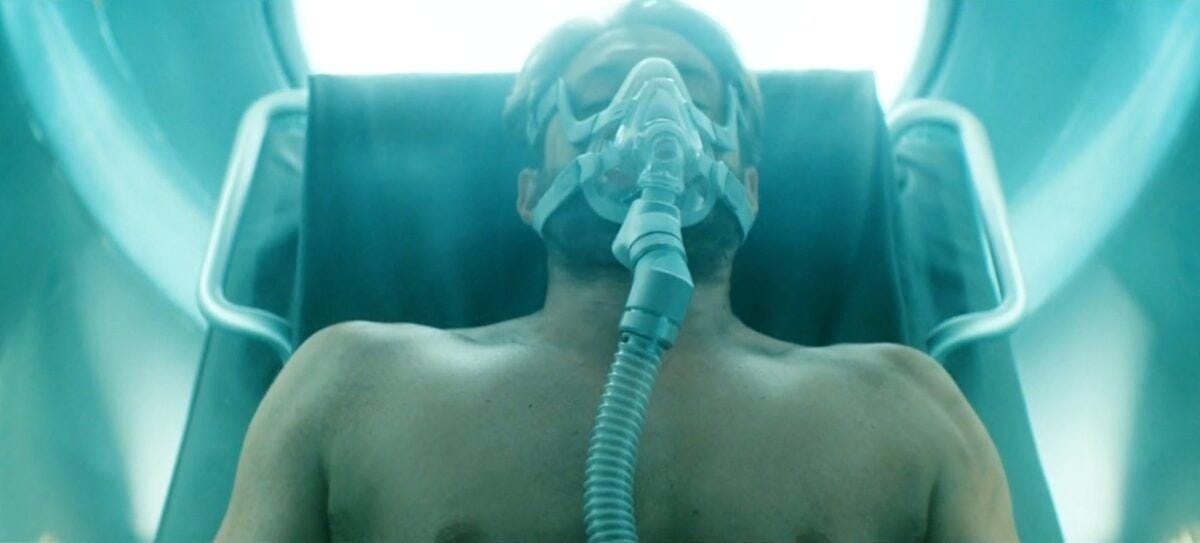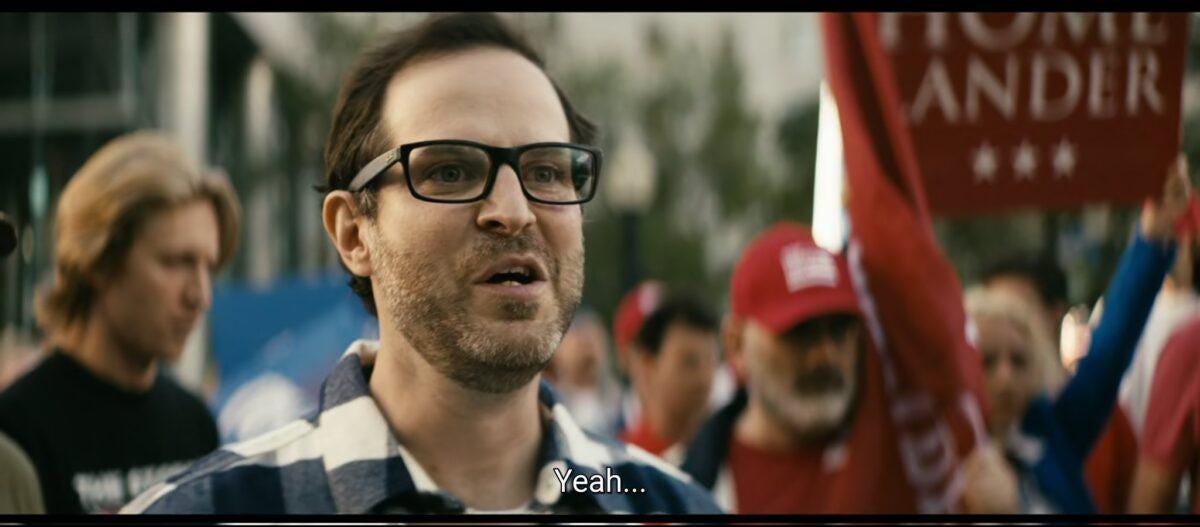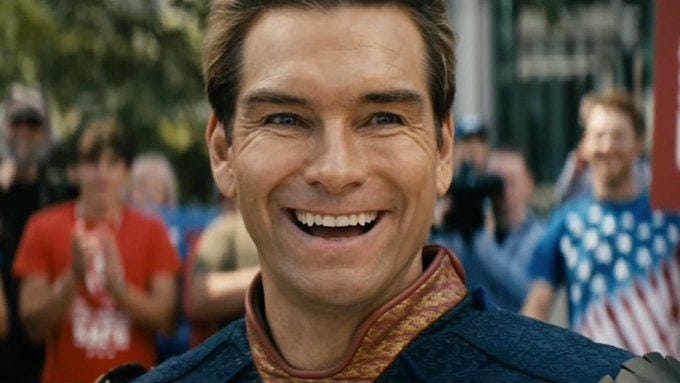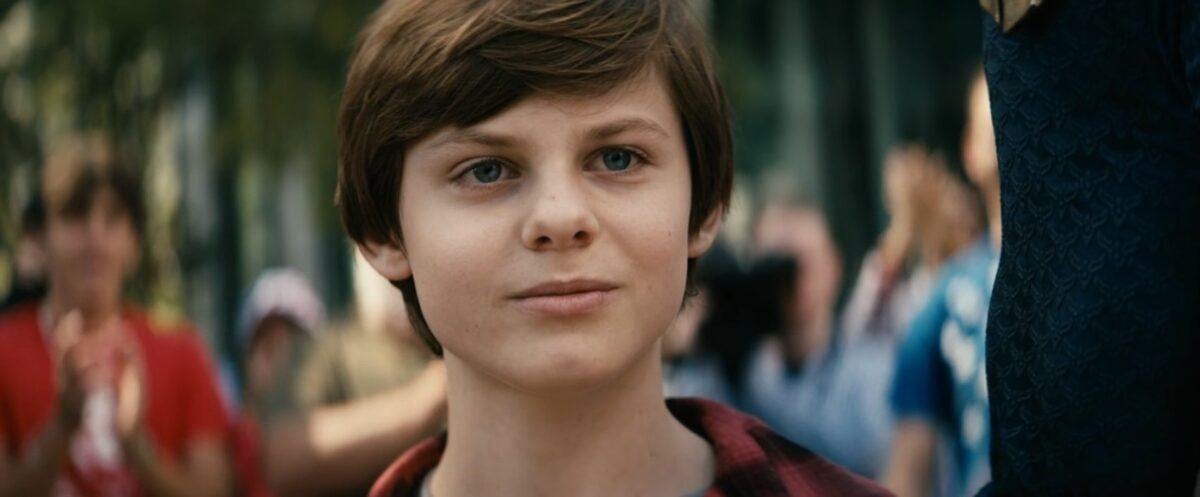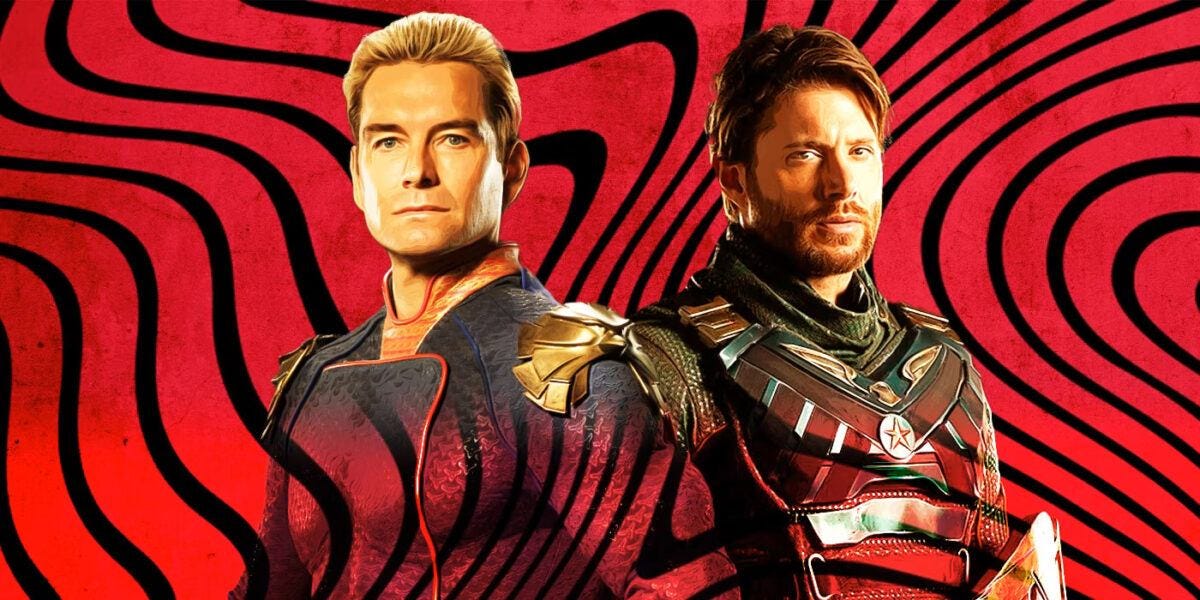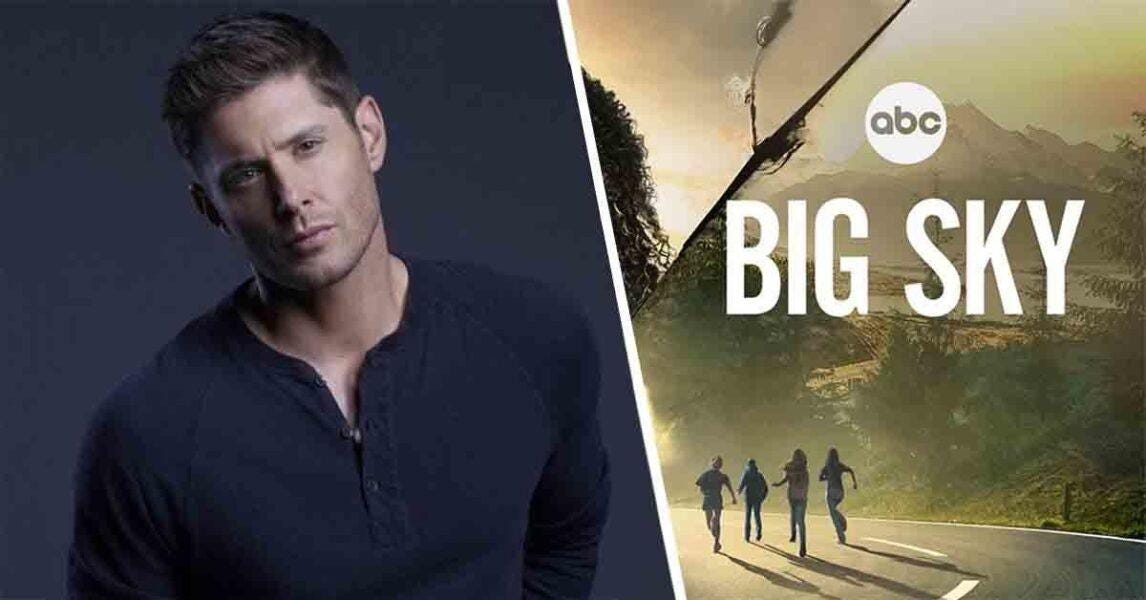‘The Boys’ Season 3 Finale tackles Fathers, Sons and power of choice deep dive review
Click to read the full story: ‘The Boys’ Season 3 Finale tackles Fathers, Sons and power of choice deep dive review
The season finale of Season 3 of “The Boys” has been one of the most anticipated ever. It’s honestly been so much fun watching the excitement ramp up each week for each episode.
It was a brilliant decision on Eric Kripke and Prime Video’s part to release the episodes over five weeks instead of all at once. Especially with the insane promotion we were treated to each week. I watched the whole season before it streamed in the press screeners, but I still felt entirely swept up in the anticipation and excitement (and, let’s face it, dread!) each week. “The Boys” earned 6 Emmy nominations last season, but I can’t imagine it not getting at least one for this incredible season!
The cast traveled to Brazil for four wild days of promotion, which only served to amp up the anticipation even more. We were treated to interviews and red carpets and the cast all having a bloody good time.
Now that everyone has had a chance to watch it, this is the spoilery recap and review of the season finale, so…
SPOILERS ahead. LOTS OF THEM!
I’ve been watching this show since its beginning and have loved it since then, but Season 3 has been a whole different ballgame. My friends at Movie TV Tech Geeks had let me know that it was a whole different type of show from “Supernatural” and “Walker.” Were they ever right, but I’m glad I jumped on like they did.
As a passionate “Supernatural” fan, the addition of Jensen Ackles as Soldier Boy meant that I was even more excited about this season, but even I wasn’t prepared for just how much I’d be drawn in by the character or just how complicated my feelings about Soldier Boy would be.
He’s an asshole and a bigot and a bully, but Ackles also portrays him with vulnerability and humor and at times he’s almost charming. I feel like I should not have been hoping for any kind of redemption arc for Soldier Boy, and yet I found myself nervous as hell going into the finale, hoping that a) he wouldn’t be killed off and b) he might find at least a little bit of redemption. Help save the day, maybe?
Well… I should know Eric Kripke better than that by now!
I’ve been writing a lot about this season of “The Boys” being all about choice, and the season finale sees every main character have to make some difficult ones.
Passing It On From Father To Son – Or Not
This season is also about the intergenerational transmission of trauma, and the toxic masculinity messages that are passed down from fathers to sons. One of those messages is about strength and power. All the men whose fathers were abusive, with either physical or verbal violence or both, have a hard time not repeating the cycle.
Butcher’s father was both, and those toxic messages are ever-present in his head, bleeding out of him in eruptions of physical violence and caustic, cruel barbs thrown at enemies and friends alike. In this episode, he vacillates wildly between giving into those violent impulses, laser focused (heh heh) on taking down Homelander and willing to use anyone as a weapon to do that, and trying to hang onto the caring part of him that wanted to protect Lenny and now wants to protect Hughie.
He never does tell Hughie about the Temp V being fatal, but he unceremoniously knocks him out with a punch and shoves him in a convenience store bathroom to keep him from taking it again. So, a few points at least in his favor?
On the other hand, he’s been fine with using Frenchie and Kimiko and now Soldier Boy to get the revenge he wants, and he’s as manipulative as ever in this episode, as he repeatedly tells Soldier Boy that Homelander is not really his son. We see Soldier Boy’s ambivalence several times, hesitating to kill his own son and emotional about having a child – but Butcher knows to play to the rage he feels at being tossed aside and replaced, focusing that rage on Homelander by telling Soldier Boy that he is his replacement and the reason he was tortured. Well played, Butcher, but chillingly cruel.
Homelander was not just abused but neglected, deprived of not just a father but a mother too. A sensitive boy like Butcher seems to have been, he too had that knocked out of him with cruelty, absorbing the same message that to be “a man” you must not only be strong and powerful but unfeeling too. Showing vulnerability is weakness, unmanly. Both men struggle to have any kind of healthy relationships – even Butcher’s with his wife was doomed once Ryan existed – and both have been increasingly isolated and alone as this season progressed.
Homelander’s cruelty has been shown vividly (RIP Timothy!) and in this episode, he is brutal to his remaining ‘loyal’ team members, ridiculing The Deep and A Train and Ashley (by forcing her to take off her wig. Damn but Colby Minifie was amazing in that scene!). Homelander rejects them all, saying he wanted his team to be his family but they aren’t his family – they’re not worthy. Little does he know that idea is about to come back to haunt him. He also rejects his ‘friend’ Black Noir in this episode, in a very final way. He can’t tolerate the perceived betrayal of Noir not telling him that his father was alive, the hurt unbearable and the violence that results his only allowable way of expressing it.
Homelander longs for family and repeatedly tries to create it for himself, but he also is stuck reiterating the abuse and rejection that he himself experienced every time he finds it. He clearly wants a relationship with his new-found father, watching old movies of Soldier Boy liberating a Nazi camp. It’s a script, of course, but it’s hard not to see a little sincerity in Soldier Boy in the extended footage as he says he’s not there to take credit, the boys here are the real heroes.
You get the feeling that he buys into his own heroism, at the very least. I wish we knew a little more about what Soldier Boy really did and did not do back in the day – he seems to have done some actual fighting, and he may have even done some good in the world despite being an asshole.
Maybe? Or is that just me wanting to believe that?
We learn in this episode that Soldier Boy’s trauma history started way before he was so horrifically tortured, and it too is about the trauma passed down from fathers to sons. His is a more common type of abuse, verbal not physical, but it clearly cut deep just the same. A rebellious son, a father who demeaned and rejected him. A son who went to great lengths to win his father’s approval and was still met with rejection.
The abuse, much like Butcher’s and Homelander’s, was delivered wrapped up in misogynistic and homophobic insults, the implication that he wasn’t a “real man” and wasn’t good enough. That’s been a defining theme in Ben’s life ever since, and it has had the same effect of cutting him off from any real relationships as he bullies and abuses others, channeling the violence and insults he learned from his own father.
Frenchie and Kimiko’s story runs parallel to and touches on some of these themes. Frenchie was abused by his father too (it’s perhaps the most pervasive theme in the entire show). His response has been different but no less pathological – he’s taken refuge in drugs or tried to take control of violence meted out to him by making the choice to engage in it with lovers like Little Nina.
He plays it out with Butcher too, allowing Butcher to use him and verbally abuse him as another twisted father figure. In this episode, MM confronts him about his drug use, and eventually Kimiko does too. And she finally gets through to him, in one of my favorite scenes from the finale, as she slaps him away from doing more coke. Frenchie insists he did his part, but Kimiko signs ‘We’re not finished, asshole!”
Kimiko: Our past is not who we are. I thought I’d always be broken – but you saw something in me. I see it in you.
That’s where the show differs from Freud a little bit, making the case that we don’t have to be forever defined by the traumas of our past, that we can do something different and be something different. Frenchie finds his strength in this episode, not only saving the day in the stereotypical way by mixing the deadly nerve agent they need to subdue Soldier Boy, but by finally standing up to Butcher and refusing to be used or mistreated anymore.
Butcher: You shut your fucking cakehole, Frenchie!
Frenchie: No, my cakehole will remain open! You will never command me again. I deserve respect – and we all deserve paid vacation days…and a dental plan!
Kimiko beams at him, proud. I laughed out loud, but I was also beaming.
Hughie and Annie have been butting heads for half the season over another version of toxic masculinity – the question of who should save who and what it means if you’re the one saved versus the one doing the saving. Hughie’s dad is the contrast to all the toxic fathers in this show, but Hughie hasn’t realized it until now.
Because even if we’re not raised with that toxicity, it’s always there in the culture, and we all absorb those messages, like it or not. Hughie has swallowed them too, scared that Annie being stronger and “saving” him somehow makes him less of a man, and ridiculing his own father for being too passive and not actively (stereotypically) “heroic.”
In this episode, Hughie has a revelation – and it’s another of my favorite scenes of the season. Annie comes to pick him up at the convenience store, giving her explicit permission to say ‘I told you so’ to him – which she does with great relief.
I love Hughie and Annie’s dynamic together, and it was great to see them back on the same page. Hughie realizes that Butcher knocked him out in a backhanded (heh heh) way of saving his life. He also realizes that his actual father was much more of a hero than he ever gave him credit for.
Hughie reminisces about his dad making them pizza rolls after his mom left, sitting with Hughie to watch “Remington Steele,” never fighting back for her or for anything, just eating pizza rolls.
Hughie: I spent so much time thinking he was sad and weak and a loser. But Dad was there, taking care of me during the worst days of his life, trying to keep the lights on and a roof above our heads. He wasn’t weak – I didn’t know what strength was.
Hughie’s realization is the biggest push back against all the toxic masculinity messages that the show has been grappling with this season. Beautiful writing by David Reed and Logan Ritchey and perfect delivery by the oh-so-talented Jack Quaid.
Annie and Hughie put their money where their mouths are as far as understanding what strength really means (and that collateral damage is not something they’re okay with) by putting a lot of energy into trying to warn all the people working in Vought Tower that they need to evacuate as the showdown is imminent. Hughie is also determined to try to save Butcher, insisting there’s still good in him deep…deep….DEEP…inside him.
Hughie: We save everyone, even if they don’t deserve it. Especially if they don’t deserve it.
That’s a refusal to buy into the collateral damage is okay that’s on another level than we usually see in this show, from either side.
Missing Fathers, Found Fathers
The other portion of the intergenerational theme, of course, is the parenting part of fathers and sons. While Hughie finally realizes that his dad did a pretty damn good job of it under near impossible circumstances, the other characters are struggling with it.
Butcher tried to be a father figure to Ryan and couldn’t do it, eventually mirroring his own father’s cruelty and walking away even though he clearly still cares about Ryan. Homelander tried parenting Ryan too, messing it up enough to push him off a roof top and leading to an estrangement – until this episode. When he finds Ryan, he forgives him for what he accidentally did to his mother – and probably the only one who really understands what that feels like. The dialogue here is spot on, and so is Starr’s delivery.
Ryan asks, hesitant and fearful, if Homelander isn’t mad at him for what he did.
Homelander: It wasn’t your fault, right? Son, when you’re as strong as we are, accidents happen. Things break, and sometimes they’re the things you love the most. But that’s all it is, an accident. Nobody knows that better than me. That’s why I’m always gonna love you no matter what you do. I’m not going anywhere, I’ll always be here.
It could be viewed as manipulative except it’s so clearly exactly what Homelander himself has longed to hear his entire life. I’ve been writing all season about the idea of “collateral damage” and the ethics of how we view it (which is a real-life question as well).
It’s one of the things that makes Soldier Boy not a good guy – he doesn’t go out of his way to hurt people, but if they get in his way or trample on his ego, collateral damage doesn’t really bother him very much. We’ve seen how much it bothers someone like Queen Maeve with the plane incident – and how comparatively easily Homelander shrugged off the deaths of all those people. You get the feeling it wasn’t always that easy for him to do, but he’s convinced himself over time that it’s inevitable, part of the price he pays for being the “hero” he is. When you’re that much more powerful than everyone else, there is bound to be collateral damage. A lot of it. Sadly, that may be true for Ryan too.
It’s a theme that reminds me of one of the later seasons of “Supernatural” (because everything reminds me of “Supernatural”), when Jack, an all-powerful Nephilim who is sincerely trying to be a good person and not hurt anyone, nevertheless manages to hurt some innocent kids who he’s just trying to impress. That’s a tragic lesson (and it had a relatively happy ending for Jack) but we all can’t help but wonder how this is going to end for the clearly very powerful Ryan.
Ironically, the one who comes out looking the least horrible at the end of this episode when it comes to parenting is Homelander (and believe me, he still looks plenty horrible!). When it comes down to it in the middle of the epic fight scene where everyone is tearing apart everyone else, it’s Homelander who is more concerned about Ryan than revenge, at least momentarily, turning on Soldier Boy to protect Ryan and even teaming up momentarily with Butcher to do so.
Mother’s Milk also didn’t have the toxic upbringing that some of the others did, but his father ended up being neglectful after the trauma of what Soldier Boy did to their family, so he carries some of those same scars and has the same violent impulses and need for revenge. Unlike Butcher, though, he struggles not to give in wholeheartedly to them, genuinely distraught when he loses his temper in front of his daughter and punches Todd (though every single person watching thought Todd totally deserved it…).
Frenchie reassures MM that while he’s as broken and fucked up as the rest of them, nevertheless he’s the best man Frenchie knows. For the most part, MM is able to curtail his impulses and save the violence for when it’s actually needed – instrumental aggression, if you will. His definition of “being a man” doesn’t require violence; in fact, being a strong man and a good father to MM and his family mean curtailing it and “keeping your fucked up shit” away from your kids. Protecting them.
By the end of the episode, he’s no longer hiding what he’s fighting for from Janine, and she calls him her hero. The message that the struggle against violence is part of heroism is one we don’t hear very often, and it feels important.
Black Noir has perhaps the most tragic arc in this episode, since he’s the only one who doesn’t survive it. The reason for his death, ultimately, is that he kept the secret of Homelander’s father from him, which is something Homelander cannot forgive. The cartoon voices in his head convince him that he can face his fears, so he makes the mistake of going back to Vought Tower and insisting to Homelander that they have to kill Soldier Boy. (It breaks my heart a little that he spells it “SOLDIR BOY”).
Their reunion goes from Homelander embracing his friend (with cartoon hearts floating around them) to Homelander realizing that Noir must have known that his father was alive all this time. It’s a reiteration of all the times people kept Homelander (and more to the point, young John) from the people he needed and left him horrifically alone.
Homelander punches Black Noir so hard, his fist goes right through, with all the gory shots of bloody spilling out entrails and squishy sound effects you would imagine in the aftermath. Noir was not a good guy either and we all know it, but it was hard to watch him fade away, his cartoon voices reassuring him right to the end.
Homelander: You shoulda told me.
To Supe Or Not To Supe
This is the question that’s all about choice.
A Train makes the choice to go back to being a supe, even if it means sacrificing his family (and isn’t that really the theme of this episode?). On the road to full recovery, he wants his brother to be his trainer again, wheelchair or not, but Nate has had it with him. He refuses, furious that A Train killed Blue Hawk in a rage of vengeance instead of letting justice play out and afraid for the example that will set for his children.
The theme of parenting plays out again, as Nate tries to do the right thing for his kids even though he must be full of rage himself. A Train is torn, and he wants to be part of his family’s life, but not as much as he wants the fame and fortune of The Seven. He’s bought into some pretty messed up ideas of being a man too, including the power that comes from being “famous” and having money. He can’t walk away from that, it’s too key to his identity and we’ve seen he feels like nothing without it, plunged back into being a target of stereotyping and prejudice. The reality side of that makes the story all the more compelling.
Hughie and Annie resolve their struggle as a couple about who should save who by making a different choice – teaming up and collaborating to save the day together, Hughie turning up all the lights to give her extra power instead of giving in to taking more Temp V. Annie rejects the trappings of superherodom altogether, dropping her super suit and boots down the trash chute and officially becoming one of “The Boys.”
Maeve also ultimately gives up being a supe, though not entirely by choice. Maeve escapes (and yes, those van drivers were collateral damage, though we can feel better about it if we decide they were evil Vought employees…). She reunites with Annie and Hughie at MM’s, inexplicably greeting poor Hughie with “It’s like you wear a neon sign that says raw dog me, I’m a bottom” – a rather pointed illustration that it’s not just other men who prop up the tropes of toxic masculinity.
Ep 8 maeve acklesism (cap acklesism)
Maeve is almost as focused on getting revenge on Homelander as Butcher is, siding with him in the ultimate showdown to make sure that happens. Annie is disappointed in her, saying she thought that deep down Maeve really was a hero, but Maeve tosses it off, saying there’s no such thing.
Maeve: Annie, I don’t want to hurt you.
Soldier Boy saunters in at that moment and tells it like it is.
Soldier Boy: But I will.
Me: Nope, not hot at all, should not be hot, nope…
But in the end, Maeve sacrifices herself by tackling an about to explode Soldier Boy out the window, saving the others but losing her supe powers in the process. (And an eye to the brutal fight she had with Homelander).
Kimiko, on the other hand, embraces her supe status having now chosen it freely. While Frenchie mixes the neurotoxin that will subdue Soldier Boy, she fights off the guards – making it a twisted dance routine to “she’s a maniac, maniac on the floor…” as she violently dispatches them. (Again, collateral damage, maybe Vought bad guys, maybe just hapless employees, who knows, yada yada.
I’m not a big fan of the ultraviolence even when it’s the ladies doing it – it’s not any more empowered when ‘girls get it done’ necessarily either. But that’s for another day).
Soldier Boy, We Hardly Knew You
And then, there’s Soldier Boy. The character, we’ve known from the start, would play out the theme of toxic masculinity that Season 3 was so much about. What we didn’t know is that so much of it would also be about the underlying theme of fathers and sons that runs through this entire season, and that somehow made Soldier Boy’s arc so much more emotional.
We’ve heard Soldier Boy, in those moments of vulnerability that Ackles makes so compelling, admit how much he wanted kids. Finding out that Homelander is his son clearly moves him; there’s a part of him that wants to connect with his son and have that kind of relationship.
Throughout the first half of the episode, every time Butcher reminds him that Homelander isn’t “really” his son, Soldier Boy just glares and then walks away. There’s a lot of ambivalence there and a lot of emotion, though we don’t get to hear what a lot of it is. Luckily, Ackles’ expressive face lets us know that whatever it is, he’s feeling a lot of it.
As Maeve puts it, “if we put Soldier Boy and Homelander in a room together, are they gonna fight or fucking hug?”
For most of the episode, we don’t know – which makes for some great tension.
My conflicted feelings about Soldier Boy continued through this episode, with both my empathy for him and my revulsion for him increasing – which makes for a lot of confusing contradictory emotion, let me tell ya!
My favorite scene in the episode is the quiet scene between Soldier Boy and Butcher, the two understanding each other even though they’re enemies. (Okay, that’s a favorite fanfic trope, so of course, this was a favorite scene). They are both holding up their best stereotypical portrayal of a tough guy, knocking back stiff drinks and speaking in gruff voices and knowing when to avoid eye contact, and yet they are also reaching out to each other, sensing the similarities between them and some part of both of them knowing there’s vulnerability underneath – because it’s underneath for both of them.
Soldier Boy laughs that he used to sneak his Dad’s manhattans.
Butcher shares that he didn’t have to sneak nothing from his dad, who would get him and his little brother lagered just for the hell of it. (Grace Mallory calls, and Butcher must know it’s about Ryan, but he doesn’t pick up – single minded on keeping Soldier Boy on task as the weapon to take out Homelander).
Soldier Boy asks if Butcher has seen “The Soldier Boy Story,” the film that chronicled his fake life – and when Butcher says no, he tells the real one.
Soldier Boy: It’s a classic. We lost best picture to “An American in Paris” that year, but at least I got to ass fuck Jane Wyman in the coat check. All about how a poor kid from the streets of South Philly discovers he’s got incredible powers to match his heart of gold.
He looks up, considers – then spills the truth. You get the feeling he’s been needing to share it with someone for a very long time. Keeping up a persona is exhausting, and ultimately soul destroying. Soldier Boy has been doing it for a hundred years.
Soldier Boy: It’s all BS. My father owned half the steel mills in the state. I went to boarding school. Got kicked out of boarding school. Because I was a fuck up. But he made sure I knew it.
This Butcher can relate to, intimately.
Butcher: Use a belt, did he?
Soldier Boy: Never laid a hand on me. He couldn’t be bothered. Said I was a disappointment. Not good enough to carry his name. So, I went to his golf buddies in the War Department and they got me into Dr. Vought’s Compound V trials. I became a superhero. Strongest man alive, fuckin’ ticker tape parades when I came home.
He says it all with bravado, trying to keep the persona up even as he’s finally telling the truth. It may seem like not laying a hand on his son was a mercy, but what comes through loud and clear is that his father cared so little about him – actively disliked him and was disgusted with him so much – that he couldn’t be bothered to discipline him.
It also implies that he was disinherited, literally losing his father – rejected. Of course, in reality, most boys don’t try to become supes to make themselves feel better, but they do go to great lengths to try to prove they ARE worthy of love – unfortunately sometimes by trying to emulate that strength, power and cruelty.
Butcher gets it.
Butcher: What’d the old man say then?
Soldier Boy smiles at Butcher knowingly, knows he gets it.
Soldier Boy: Ah. He said I took a shortcut. That a real man wouldn’t have cheated.
There it is, that ruthless attack fueled with misogyny and homophobia. That disgust that his son wasn’t a ‘real man’ and that complete rejection, even after Ben had transformed himself completely into what he was certain his father wanted him to be. Surely, he must have thought, my father will love me now.
Ackles makes Ben’s confession intensely painful. His eyes water and he looks down, breaks eye contact with Butcher, the defensive smile disappearing from his face as he gets emotional remembering. Clears his throat, takes a drink to restore that manufactured masculinity.
Realizes he’s let himself show some vulnerability, tries to cover it up. Changes the subject by asking Butcher if he’s got kids, and then saying he always assumed he had some out there, and always wanted them – because he thought he could do it better than his father did.
It’s not a bad goal, to want to parent better than a flawed parent was able to parent you. Some people can do it, it happens all the time. But you get the feeling that Soldier Boy also wants to do it better than his father not for the sake of his child but for the sake of besting his father, who he’s still in unrecognized competition with long after the man is dead and gone. And that is a recipe for disaster.
Butcher is a master manipulator though, saying Homelander isn’t his, not really.
Soldier Boy: He’s the only blood I’ve got left.
Butcher: It don’t matter. You didn’t name him, didn’t raise him. Vought grew him in a fucking test tube – to take your place. He’s the fucking reason they left you to rot. Look mate, we had a deal.
Soldier Boy knocks back his drink, macho.
Soldier Boy: I’m gonna get some air.
After a scene like that, how am I supposed to NOT root for him to survive the season??
Soldier Boy can also be a grumpy adorable (killer) grampa, so that’s part of so many of our struggle to really truly hate him. I wonder if the fact that Ackles kept referring to him as a grampa all season was a way of telegraphing that he was in fact Ryan’s actual grampa – much like the “Supernatural” fandom will never forget his cheeky description of the season finale in which Dean opens his eyes and they’re demon-black as “it’s gonna be a real eye-opener” (thanks to bhorton314 and maevesdean on twitter for putting that idea in my head).
Anyway, he wakes up in the back seat of Butcher’s car as they head to Vought Tower, looking for all the world like a sleepy Dean Winchester and asking about Hughie with “Where’s the cum guzzler?”
Okay, Dean Winchester is definitely nicer. But he lies back down, still grumpy and still kind of adorable, so there’s that.
Father Vs. Son
The eventual, inevitable confrontation between Soldier Boy and Homelander was every bit as epic as expected, but unexpectedly painful to watch. That first moment when Homelander turns around to face his father – who’s he longed for all his life – was so full of tension that I think I was biting my nails. And I don’t even bite my nails!
Homelander says he killed Noir, “because he didn’t tell me about you.” That he knows what it’s like to have your team betray you, but with the two of them together, nobody would stand a chance.
Soldier Boy: Unless we kill each other first.
Homelander says that’s true, but argues that nobody else matters, they’re nothing, they’re human. Butcher is still manipulating Soldier Boy like a puppet, reminding him that “he ain’t your kid.” Soldier Boy looks conflicted as he comes closer, emotional but stoic too.
Homelander: Yes I am! I’m your blood, that’s all that matters.
Soldier Boy: Maybe.
Homelander brings out Ryan, tells Soldier Boy that they’re a family, that Soldier Boy has him and “you have me.”
I honestly thought that would get through to Soldier Boy. It’s what he wanted, and especially with Ryan, it could be a chance to raise a child and “do it better”. But Soldier Boy is confronted with a son who personifies all the things he hates most about himself – weak, longing for approval and love, the opposite of a “real man”. Wearing a cape. And he can’t look past it, although it’s clear part of him very much wants to.
It’s tragic that, in the final moment, Soldier Boy can’t shake loose of his father’s brutal definition of what it is to be a man. All he can see is Homelander looking silly, weak. Unmanly. All those things that Ben’s father called him, and that he constantly fears in himself, and so he can’t bear to see that in his own son. He lashes out, recapitulating his own father’s rejection and cruelty.
Soldier Boy puts his hand on his son’s shoulder, Homelander clasping his father’s arm in return.
Soldier Boy: Maybe if I’d raised you, I could’ve made you better… not some weak sniveling pussy starved for attention…but there’s no fixing that now.
Homelander looks genuinely stricken, Antony Starr making me feel way too much.
Homelander: Weak? I’m you…
Soldier Boy: I know. You’re a fucking disappointment.
He looks anguished, close to sobbing, channeling the words of his own father, his face collapsing, but there’s so much rage there too – at his father, at the betrayal that kept him from raising his own son, at himself – full of self-loathing and now confronted with it in his own child.
I had a really hard time watching that scene and I don’t think I can rewatch it for some time. I wanted Soldier Boy’s vulnerability to win out, and it didn’t. I wanted him to actually DO what he says he wanted to do – be different than his father. Be a different type of man and a different type of parent to his son (and grandson).
He wants it, but he’s too flawed to actually do it, having bought into the same impossible standards his father set for him. It wouldn’t be nearly as painful if a) it wasn’t Jensen Ackles and Antony Starr absolutely killing it, and b) it didn’t happen that way in real life sometimes too.
Soldier Boy attacks Homelander, choking him. Ryan yells at him to stop, and then all hell breaks loose.
It might have been different with Ryan if Ryan hadn’t immediately chosen his father’s side when Soldier Boy attacks him, lashing out at Soldier Boy with his laser eyes. You don’t get more than one chance with Soldier Boy – he’s hypervigilant for betrayal of any kind, and Ryan’s defense of Homelander flips a switch in him that’s horrifying to see. Even if the switch hadn’t switched, though, you get the feeling that Soldier Boy would never have been able to do that “better job” he wanted to, his expectations just as fucked up as his own father’s were. Soldier Boy cannot tolerate betrayal and his ego cannot take being bested, even by his own grandson.
Soldier Boy: You little shit!
He attacks Ryan, and Butcher attacks him, laser eyes fended off by his shield. One of the best moments of the fight was Homelander and Butcher both trying to protect Ryan and teaming up against Soldier Boy, laser eyes joining to send him flying backwards and crashing through a glass wall. They exchange a glance, a moment of solidarity – for Ryan’s sake. Father figures united to protect a son.
The Final Showdown
Soldier Boy staggers up, broken glass all around him, and the long-awaited confrontation with Butcher finally happens.
Soldier Boy: What the fuck are you doing?
Butcher: Not the kid
Soldier Boy: I thought you said blood doesn’t matter, that’s the whole fucking point!
That was a painful, because that’s been Butcher’s manipulation all along, and Soldier Boy bought into it in a tragic way. Butcher confesses that Ryan is his wife’s son, and Soldier Boy is incredulous, saying Homelander fucked his wife and now he wants to save the brat?
Soldier Boy: So, this is it – everything you wanted, he’s right fucking there, and now you blink?
Butcher: Stand down.
Soldier Boy: Fuck you!
Me: Damn it, that should not be hot. Damn it, GUHHHHHH.
Soldier Boy: You’re weaker than he is.
It’s all about that to him, all about showing strength, being the strongest. He has nothing but derision for weakness of any kind – including his own.
While Butcher and Soldier Boy slug it out in a fight scene that is AMAZING, Homelander comforts Ryan, saying the right things that he himself always wanted to hear: I’m right here, you’re okay.
Maeve takes that moment to attack Homelander, who tries to get her to back down, but she refuses, finally seeing her chance and unwilling to give it up even if Homelander’s right when he says there are “bigger fish to fry.”
Soldier Boy tosses Butcher across the room and then advances on him, stalking like a fucking predator and raising his shield – and we know what he can do with that shield. At that second, MM and Starlight and Kimko join the fight and together, they manage to shatter Soldier Boy’s shield. Like a metaphor for the fake persona of invulnerability he’s built around himself, he looks shocked and exposed when that happens, his face slashed and bleeding.
There’s a final confrontation when Starlight, powered up even more by the extra light Hughie throws on for her, manages to fly; lights blowing and sparks flying as she rises up and Soldier Boy looks on, looking way too pretty in the glittery lights.
He makes a run at Starlight, and she throws Soldier Boy violently back. He staggers up, bleeding, and it’s a reiteration of the cartoon scene when his team turned on him in Nicaragua as they all hold him down and put the mask on him, and not gonna lie, my heart bled a little.
MM: You ain’t no hero, just another racist piece of shit we can’t seem to get rid of. This is for my family!
I’m fully aware I’m supposed to cheer at that line but honestly the words stuck in my throat. Soldier Boy starts to power up, roaring in rage and anguish, screaming that he’s “not going back in that fucking box!”
Butcher makes the right choice in the end, leaving the fight to take down Soldier Boy to try to protect Ryan. Maeve does too – she gives Homelander one last shove and then tackles Soldier Boy out the window before he goes nuclear and kills them all, the explosion happening when they’re safely away from the building.
In the aftermath, Queen Maeve is proclaimed a role model for little girls everywhere as a “strong proud lesbian who made the ultimate sacrifice.” In real life, she says goodbye to Annie and leaves with Elena, headed for a quiet life on the farm as Elton John sings about it.
Butcher gets the bad news that he only has a year to live.
MM finally tells his daughter the truth about what happened to their family and embraces that his father spent his life trying to get justice – and that he now does too. (I quibble with the characterization of MM’s dad as a hero because he did that and neglected his family to do so, but…) Janine says he’s her hero, and that is mostly what MM wanted. I hope he can find the balance that will let him be one in a way that’s not just about revenge.
The Deep stays loyal to Homelander, taking out the VP candidate to make room for Victoria Neuman to take that spot, which means we get a little glimpse of Jim Beaver playing a Robert Singer who is not at all the Bobby Singer we knew and loved in “Supernatural.”
The Deep is not in good shape by the end, however, watching his wife’s betrayal on TV as she promotes her new tell-all book. (I like that The Deep is often treated as the flip side of gender role stereotypes in his skintight suit and tearful Doritos eating.)
Grace Mallory watches as they wheel a naked unconscious Soldier Boy in on a gurney, gas mask over his face again, and seal him into a metal tube. Elton John sings “you can’t trap me in your penthouse, I’m goin’ back to my plow…”
Annie throws her super suit and boots away, saying it never gave her power, that “has always just been me.” She’s unanimously welcomed as one of “the boys.” On the TV, Victoria Neuman is announced as the VP candidate with Dakota Bob, and Soldier Boy’s statue is toppled.
Protestors attack the media, dressed in red, white and blue, flags everywhere, tee shirts with “Sorry, Snowflake” and Homelander on them. Todd is there, indoctrinated in the crowd.
Homelander descends, and introduces the adoring crowd to Ryan, who hesitantly floats down beside his father. A random guy in the crowd throws something and it hits Ryan. Homelander lasers him and his head explodes – and for a moment Homelander is scared, thinking he’s gone too far. Then Todd starts clapping – and the mindlessly adoring crowd follows.
Homelander, relieved, smiles. (And if you didn’t think about standing in the middle of Fifth Avenue and shooting someone without losing voters, I’m shocked because, as Kripke says, this show ain’t subtle).
But it is at times brilliant.
Ryan takes it in. Then, slowly, he smiles too.
And that chilling image is what ends Season 3. A suitably twisted instrumental score starts to play, Chris Lennertz’ brilliance always enriching what is happening on screen.
Wow.
What a season and what a finale! I was a mess of conflicting emotions by the end – but mostly impressed by every single performance.
And yes, I admit I’m glad Soldier Boy is alive. I feel like we got just enough of a taste to whet our appetites for more, and I really really hope that we get it.
Jensen said in an interview that once he found out that Soldier Boy is Homelander’s father, he took note of what Antony Starr was doing with that character and emulated it a bit. Both Starr and Ackles are so damn GOOD that when they show their characters’ vulnerability, you really feel it – and you really believe it.
Maybe that’s why no matter how much I remind myself they are both class A assholes, I also feel empathy for their trauma and tragic circumstances. So yes, I want Soldier Boy back!
Ackles is already busy filming the next season of Big Sky, but Kripke has already said that Soldier Boy will be back at some point, and Jensen has already said that he’s game, so I’m hopeful we’ll see more of him soon. Thanks to the entire cast and crew of “The Boys” for an amazing, exhilarating, thought-provoking wild ride!
The post ‘The Boys’ Season 3 Finale tackles Fathers, Sons and power of choice deep dive review appeared first on Movie TV Tech Geeks News By: Lynn Zubernis



